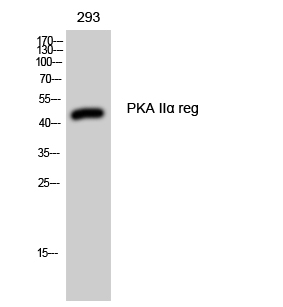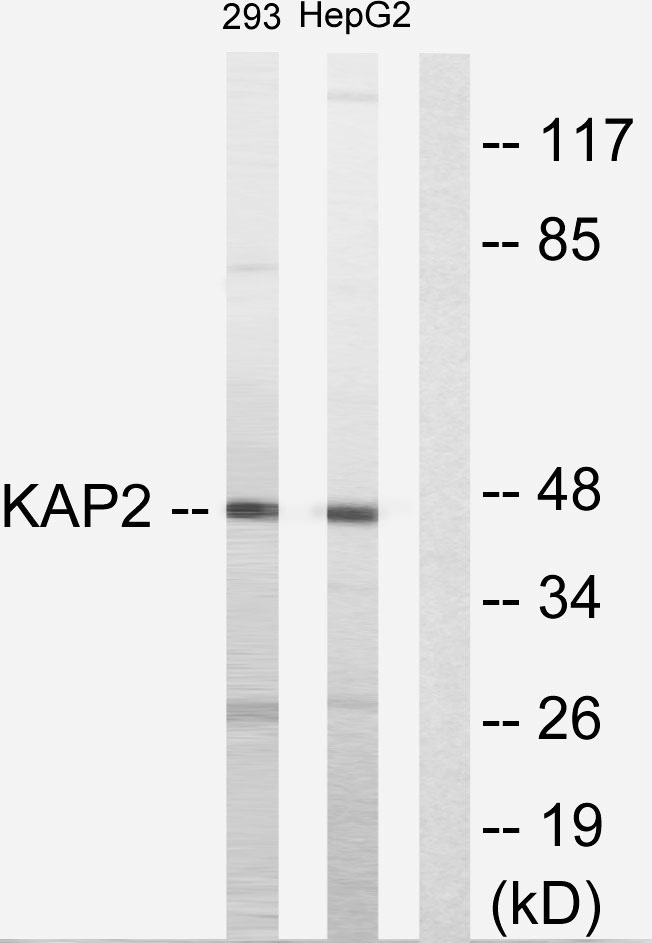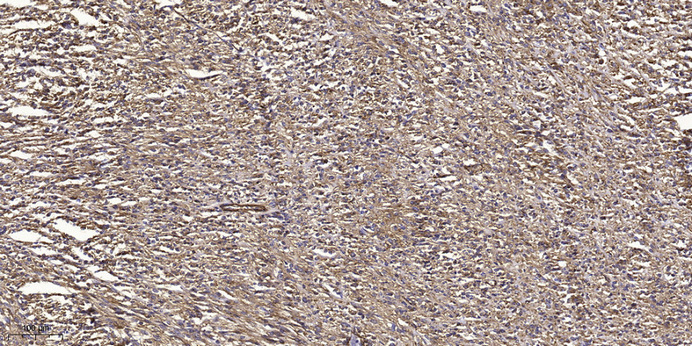PKA IIα reg Polyclonal Antibody
- Catalog No.:YT3744
- Applications:WB;IHC;IF;ELISA
- Reactivity:Human;Rat;Mouse;
- Target:
- PKA IIα reg
- Fields:
- >>Insulin signaling pathway
- Gene Name:
- PRKAR2A
- Protein Name:
- cAMP-dependent protein kinase type II-alpha regulatory subunit
- Human Gene Id:
- 5576
- Human Swiss Prot No:
- P13861
- Mouse Swiss Prot No:
- P12367
- Immunogen:
- The antiserum was produced against synthesized peptide derived from human KAP2. AA range:41-90
- Specificity:
- PKA IIα reg Polyclonal Antibody detects endogenous levels of PKA IIα reg protein.
- Formulation:
- Liquid in PBS containing 50% glycerol, 0.5% BSA and 0.02% sodium azide.
- Source:
- Polyclonal, Rabbit,IgG
- Dilution:
- WB 1:500 - 1:2000. IHC 1:100 - 1:300. IF 1:200 - 1:1000. ELISA: 1:10000. Not yet tested in other applications.
- Purification:
- The antibody was affinity-purified from rabbit antiserum by affinity-chromatography using epitope-specific immunogen.
- Concentration:
- 1 mg/ml
- Storage Stability:
- -15°C to -25°C/1 year(Do not lower than -25°C)
- Other Name:
- PRKAR2A;PKR2;PRKAR2;cAMP-dependent protein kinase type II-alpha regulatory subunit
- Observed Band(KD):
- 45kD
- Background:
- protein kinase cAMP-dependent type II regulatory subunit alpha(PRKAR2A) Homo sapiens cAMP is a signaling molecule important for a variety of cellular functions. cAMP exerts its effects by activating the cAMP-dependent protein kinase, which transduces the signal through phosphorylation of different target proteins. The inactive kinase holoenzyme is a tetramer composed of two regulatory and two catalytic subunits. cAMP causes the dissociation of the inactive holoenzyme into a dimer of regulatory subunits bound to four cAMP and two free monomeric catalytic subunits. Four different regulatory subunits and three catalytic subunits have been identified in humans. The protein encoded by this gene is one of the regulatory subunits. This subunit can be phosphorylated by the activated catalytic subunit. It may interact with various A-kinase anchoring proteins and determine the subcellular localization of cAMP-dependent protein kinase. This subunit has b
- Function:
- function:Type II regulatory chains mediate membrane association by binding to anchoring proteins, including the MAP2 kinase.,PTM:Phosphorylated by the activated catalytic chain.,similarity:Belongs to the cAMP-dependent kinase regulatory chain family.,similarity:Contains 2 cyclic nucleotide-binding domains.,subunit:The inactive form of the enzyme is composed of two regulatory chains and two catalytic chains. Activation by cAMP produces two active catalytic monomers and a regulatory dimer that binds four cAMP molecules. Interacts with AKAP4 and CBFA2T3.,tissue specificity:Four types of regulatory chains are found: I-alpha, I-beta, II-alpha, and II-beta. Their expression varies among tissues and is in some cases constitutive and in others inducible.,
- Subcellular Location:
- Cytoplasm . Cell membrane . Colocalizes with PJA2 in the cytoplasm and the cell membrane.
- Expression:
- Four types of regulatory chains are found: I-alpha, I-beta, II-alpha, and II-beta. Their expression varies among tissues and is in some cases constitutive and in others inducible.
- June 19-2018
- WESTERN IMMUNOBLOTTING PROTOCOL
- June 19-2018
- IMMUNOHISTOCHEMISTRY-PARAFFIN PROTOCOL
- June 19-2018
- IMMUNOFLUORESCENCE PROTOCOL
- September 08-2020
- FLOW-CYTOMEYRT-PROTOCOL
- May 20-2022
- Cell-Based ELISA│解您多样本WB检测之困扰
- July 13-2018
- CELL-BASED-ELISA-PROTOCOL-FOR-ACETYL-PROTEIN
- July 13-2018
- CELL-BASED-ELISA-PROTOCOL-FOR-PHOSPHO-PROTEIN
- July 13-2018
- Antibody-FAQs
- Products Images

- Western Blot analysis of 293 cells using PKA IIα reg Polyclonal Antibody

- Western blot analysis of lysates from 293 and HepG2 cells, using KAP2 Antibody. The lane on the right is blocked with the synthesized peptide.

- Immunohistochemical analysis of paraffin-embedded human small intestinal carcinoma tissue. 1,primary Antibody was diluted at 1:200(4° overnight). 2, Sodium citrate pH 6.0 was used for antigen retrieval(>98°C,20min). 3,Secondary antibody was diluted at 1:200


